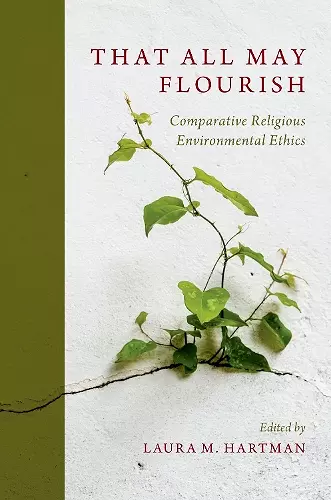That All May Flourish
Comparative Religious Environmental Ethics
Format:Paperback
Publisher:Oxford University Press Inc
Published:12th Jul '18
Currently unavailable, and unfortunately no date known when it will be back
This paperback is available in another edition too:
- Hardback£91.00(9780190456023)

Can humans flourish without destroying the earth? In this book, experts on many of the world's major and minor religious traditions address the question of human and earth flourishing. Each chapter considers specific religious ideas and specific environmental harms. Chapters are paired and the authors work in dialogue with one another. Taken together, the chapters reveal that the question of flourishing is deceptively simple. Most would agree that humans should flourish without destroying the earth. But not all humans have equal opportunities to flourish. Additionally, on a basic physical level any human flourishing must, of necessity, cause some harm. These considerations of the price and distribution of flourishing raise unique questions about the status of humans and nature. This book represents a step toward reconciliation: that people and their ecosystems may live in peace, that people from different religious worldviews may engage in productive dialogue; in short, that all may flourish.
[That All May Flourish] provides much to advancing interreligious, cross-cultural inquiry into better understanding the ways that human flourishing and ecological well-being are enmeshed. * Michael VanZandt Collins, Boston College, Religious Studies Reviews *
This is a great text that challenges the dominant language of stewardship and the Anthropocene and offers the metaphor of flourishing instead. It will be a great supplemental text for courses on comparative religion, environmental ethics, and religion and nature. I appreciate that it includes both comparative approaches, but also a topic-centered approach. Furthermore, the case studies that many of the authors use to anchor their work will be valuable in the classroom! * Whitney A. Bauman, Journal for the Study of Religion, Nature and Culture *
With accessible chapters covering a range of academic disciplines and religious traditions, this book should be studied by scholars and educated lay readers of environmental ethics. Theologians and philosophers will find wisdom from the "flourishing" approach to environmental ethics, not only in their own traditions but in other religious traditions as well. Students will find the brief dialogue chapters an easy entry into key questions. * Harold Coward, Theological Studies *
Overall, though, this book is challenging and impressive in scope, and it is far more successful than most edited volumes at creating insight and interest across its different discussions. The editor and the contributors are to be commended on their collective work on this project. * Anne Mocko, Concordia College, Reading Religion *
Written from a process of learned exchange across traditions, this book hosts a focused dialogue on something that matters for every living thing: what it means to flourish. Curated with originality and carefully written, this volume will be especially useful for teaching in courses on religion, on environmental studies, and on cultural dialogue. * Willis Jenkins, Professor of Religious Studies and Co-Director of the Institute for Practical Ethics at the University of Virginia *
Laura Hartman has done something extraordinary: she produced a volume on comparative religious ethics whose organization replicates the type of productive dialogue at the core of this enterprise. When you add that the chapters are written in an accessible and engaging style, and this is the first comparative religious ethics collection that focuses on the non-human world, it is a must read for all ethicists. * Elizabeth Bucar, author of Pious Fashion: How Muslim Women Dress *
In this fascinating, timely, and suggestive collection, the contributors extend the concept of 'flourishing' beyond human-centered virtue ethics to the wider world of ecology and environmental ethics. As a work of comparative religious ethics, it exemplifies a novel and welcome approach to cross-cultural analysis: the chapters each combine specialist attention to particular cases in context, with ongoing constructive dialogue around important aspects of human, animal, and environmental flourishing. * Aaron Stalnaker, Associate Professor of Religious Studies, Indiana University *
ISBN: 9780190456030
Dimensions: 231mm x 155mm x 20mm
Weight: 458g
328 pages